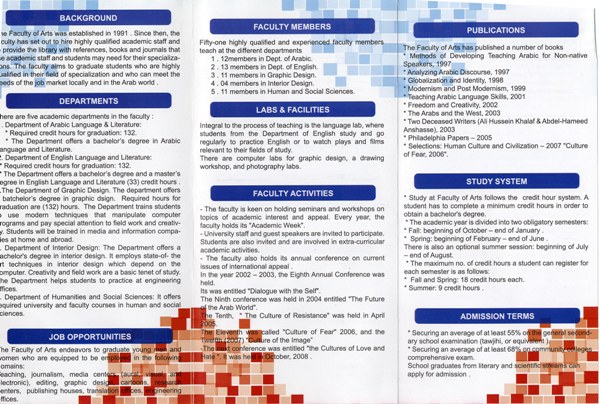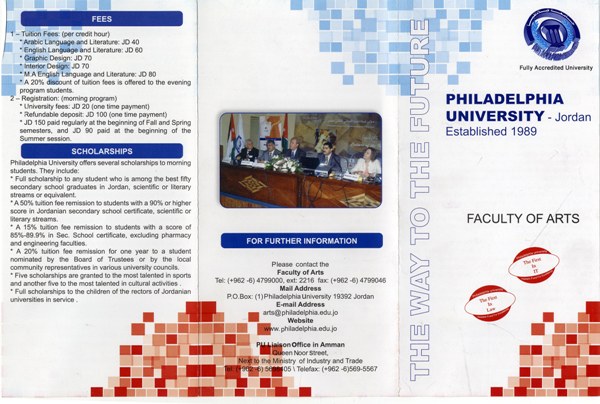Bachelor
Bachelor arabic language
Student Handbook for Department of Arabic Language and Literature
|
اسم المساق |
رقم المساق |
الخطة |
|
فن الكتابة والتعبير |
110111 |
|
|
تذوق النص الأدبي |
110112 |
|
|
فن الخطابة والحوار |
110113 |
|
|
علم النحو (1) |
110240 |
|
|
اللسانيات |
110243 |
|
|
علم الصرف |
110247 |
|
|
علم العروض |
110248 |
|
|
البلاغة العربية |
110250 |
|
|
الأدب الجاهلي |
110260 |
|
|
أدب صدر الإسلام والأدب الاموي |
110261 |
|
|
المكتبة العربية والمعاجم |
110280 |
|
|
علم العروض |
110282 |
|
|
علم النحو 2 |
110341 |
|
|
الصوتيات |
110345 |
|
|
المدارس النحوية |
110346 |
|
|
النقد العربي القديم |
110351 |
|
|
الأدب المقارن |
110365 |
|
|
النثر العباسي |
110367 |
|
|
تاريخ العرب الحديث |
110395 |
|
|
علم النحو (3) |
110442 |
|
|
الشعر العربي الحديث |
110474 |
|
|
تطبيقات نحوية وصرفية |
110448 |
|
|
مناهج النقد الأدبي الحديث |
110452 |
|
|
الأدب الأندلسي |
110464 |
|
|
الأدب الأندلسي والمغربي |
110469 |
|
|
الأدب في فلسطين والأردن |
110483 |
|
|
المدارس اللغوية الحديثة |
110484 |
|
|
السرديات |
110356 |
|
|
أدب العصور المتتابعة والعصر العثماني |
110368 |
|
|
خطة الشعر العباسي |
110266 |
|
|
خطة النثر الحديث |
110478 |
|
|
نظرية الأدب |
110456 |
|
|
الأدب الحديث – نثر |
110471 |
|
|
تاريخ العرب والمسلمين حتى نهاية دولة المماليك |
110291 |
|
|
موضوع خاص في الأدب |
110477 |
|
|
مناهج البحث في الأدب واللغة |
110487 |
|
|
مصادر اللغة والأدب |
110381 |
|
|
أدب فلسطين والأردن |
110476 |
|
|
تطبيقات نحوية وصرفية |
110488 |
|
|
المعجم والدلالة |
110385 |
|
Name
|
Academic Rank
|
Website
|
||
|
1
|
 |
Ghassan Abdul Khaleq
|
Professor
|
|
|
2
|
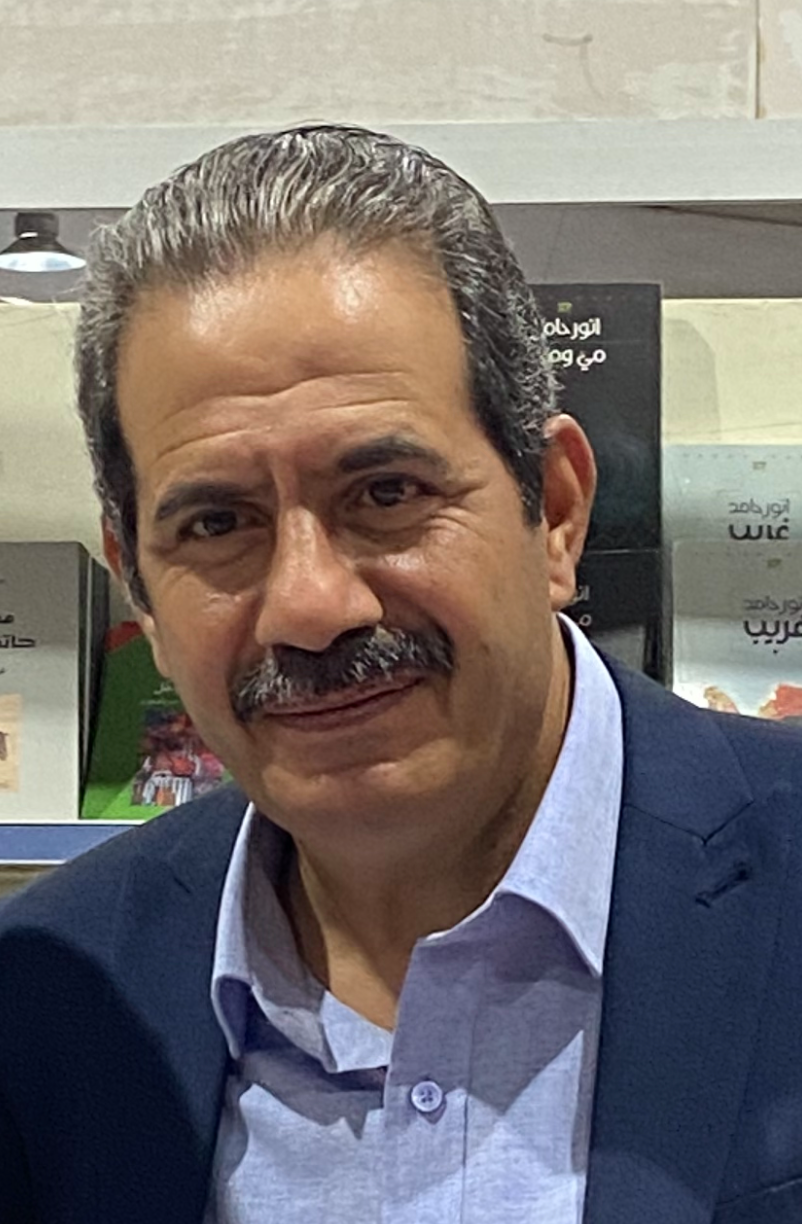 |
Muhammad Obaidellah
|
Professor
|
|
|
3
|
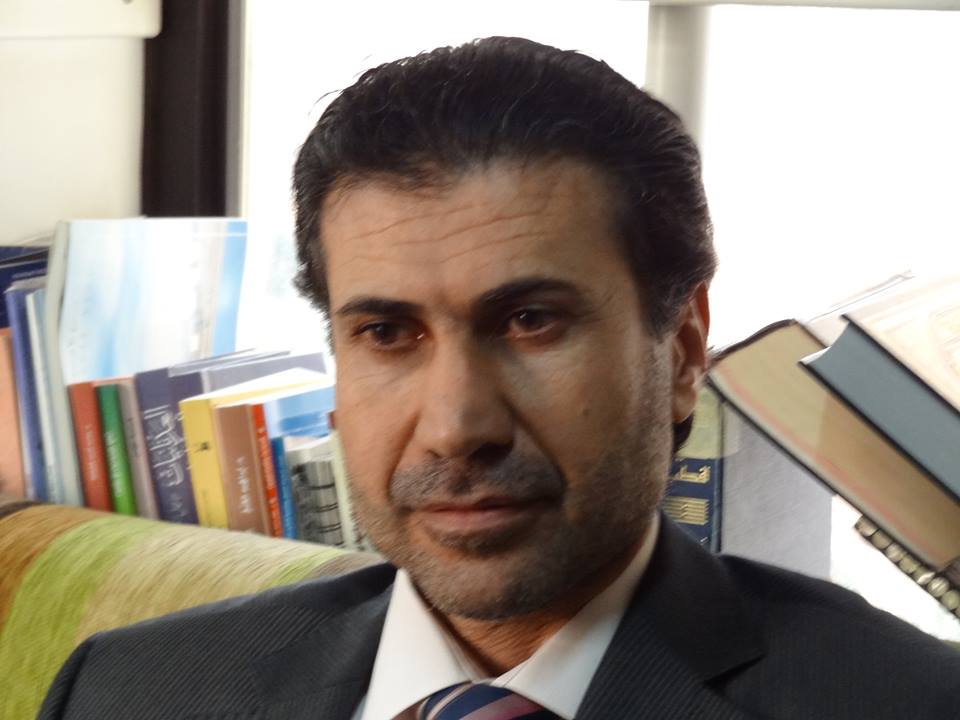 |
Yousef Rababa
|
Associate Professor
|
|
|
4
|
 |
Neda Mashal
|
Associate Professor
|
|
|
5
|
 |
Omar Faris Yousif AlKafaween
|
Associate Professor
|
|
|
6
|
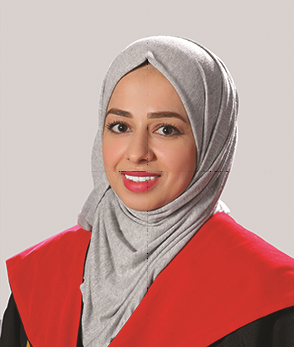 |
Leedya Rashed Abu mariam
|
Assistant Professor
|
|
|
7
|
 |
Hamzah Ibraheem Al-Nadi
|
Assistant Professor
|
|
|
8
|
 |
Omar Hajeej Alrawajfeh
|
Assistant Professor
|
|
|
9
|
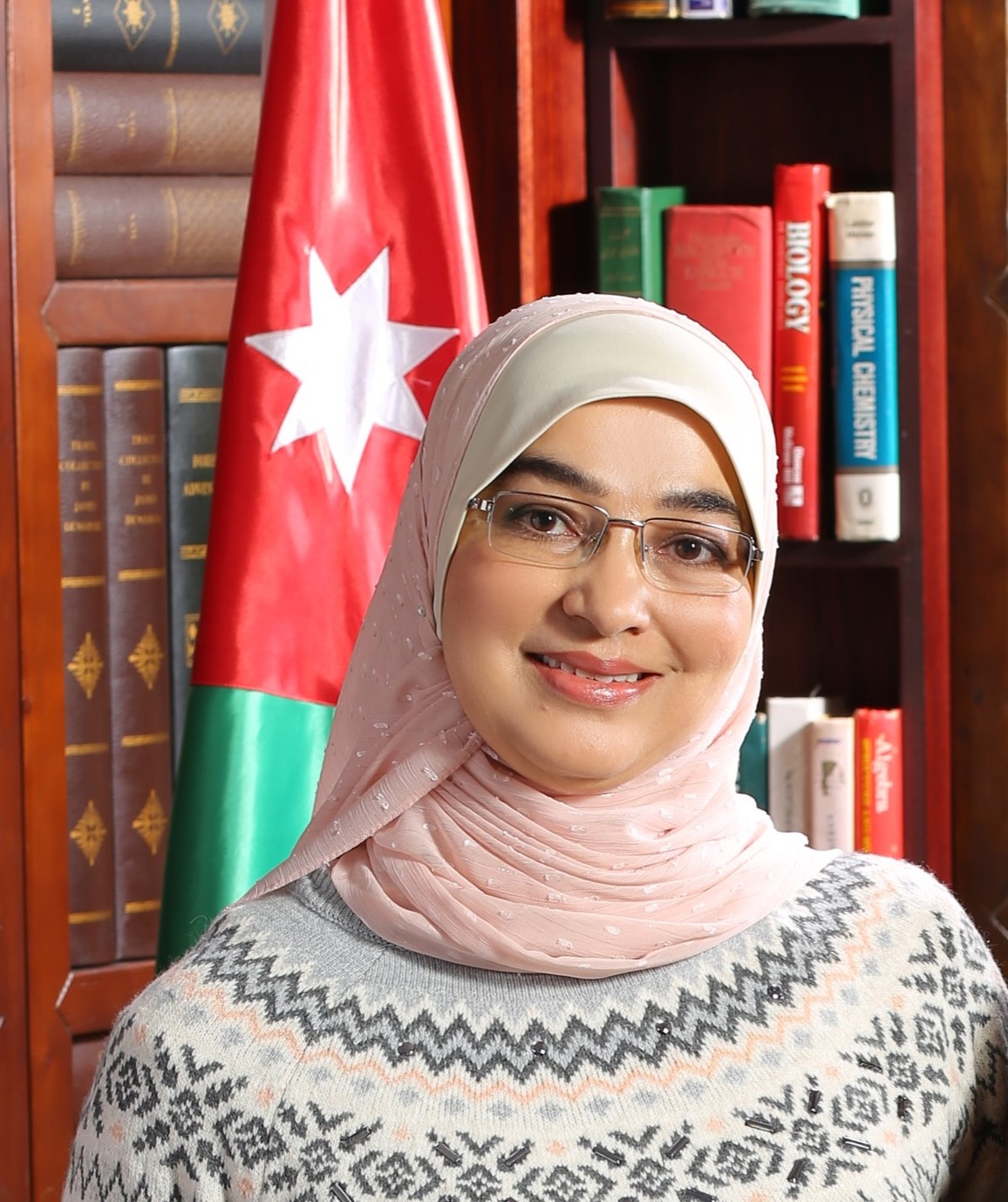 |
Rasha Abdullah Alkhatib
|
Assistant Professor
|
|
|
10
|
 |
Muhammad Ismail Amayreh
|
Assistant Professor
|
Program Benchmarks for Department of Arabic Language and Literature
A graduate of the Department of Arabic Language and Literature, Philadelphia University, is expected to have acquired the following abilities and skills:
In language:
A graduate is expected to have mastered the essentials of syntax, morphology and phonology, including their application; to have a passable knowledge of modern linguistics, including its application to Arabic.
In the domain of research, resources, and references:
To have a reasonable background in the major resources of literature, language, rhetoric, and criticism; and to have the ability to use those resources in his/her study of Arabic.
In the area of writing:
A graduate is expected to write about various topics in error-free Arabic, to have the ability to correct errors in the writings of others, which includes the skills of editing and proofreading. This also calls for his/her knowledge of the rules of spelling, punctuation, and correction of common errors.
In the area of verbal skill:
A graduate is expected to pronounce Arabic correctly and effectively; to have the ability to participate in dialogue with error-free Arabic, expressing well his/her ideas, attitudes and opinions.
In the area of literature and criticism:
A graduate is expected to have a fairly deep acquaintance of the features of traditional and modern Arabic literature, in both its prose and verse forms; to be familiar with its major figures and phenomena; to be aware of the major issues in criticism, past and present; to have some knowledge of modern critical movements, and their impact on the interpretation and analysis of texts.
In the area of Arabic rhetoric:
A graduate should have a background in the principles of rhetoric as displayed in efficient expression, diction and imagery, which make up for fine writing. A graduate is also expected to be acquainted with rhetorical methods, and to be able to use them for improving his/her skills in writing, criticism, and analysis.
In the area of verse rhythm:
A graduate is expected to know the verse meters and the different feet of Arabic poetry, to have mastered the skill of scansion, and to discover errors in scansion. At the same time he/she must be aware of the rhythm of modern Arabic verse.
Objectives of Department of Arabic Language and Literature
This program is designed to equip students with a number of skills, abilities and experiences in language, literature and criticism; which will enable them upon graduation to find employment in one of diverse fields, such us: teaching, journalism, editing, teaching Arabic for non-native learners; and preparing, editing and presenting radio programs. A graduate may be hired by one of diverse institutions, such as: schools, education institutes and centers, publishers, libraries, printing houses, research centers, web-sites, the media and cultural organizations.
Mission of Department of Arabic Language and Literature
The Department of Arabic Language and Literature, Philadelphia University, draws on both well-established sources and newly- evolving knowledge. The traditional sources include the Qur'anic text, the authentic Traditions of the Prophet, the Arabic-Islamic heritage, including its prose, poetry, language and grammar, rhetoric, criticism, and treatises on theology. The purpose of studying the traditional texts is to ensure students' identifying with their heritage, refining their cultural responsiveness, developing their linguistic and literary appreciation, enabling them to read and comprehend traditional texts, and detecting the beauty of such texts with finesse.
As for the newly-evolving knowledge in its various branches, it includes the achievements of literary theories, criticism and linguistic theories in the Western culture, the conditions of their adaptation and loaning into Arabic culture; as well as the extent of applying them in Arabic texts; this endeavor also includes investigating the points of affinity and identity between the findings of current theories and traditional ones. Besides, the Department takes care of the major developments in Arabic literature and criticism, as attested in the springing up of new literary genres: the novel, the short story, the drama, the free verse, and the prose verse; in addition to a review of modernism and its impact on Arabic literature and criticism.
The ambitious work of the Department extends to indirect objectives which are also part of the its mission: developing students' critical and analytic talents, with an eye to enabling them to take decisions, have clear attitudes, debate about opinions and values.
Contact Information
Jarash Road, 20 KM out of Amman, Amman Jordan
-
dummy P.O.Box: 1 Amman - Jordan 19392
dummy +96264799000
-
dummy +96264799040
-
dummy info@philadelphia.edu.jo

